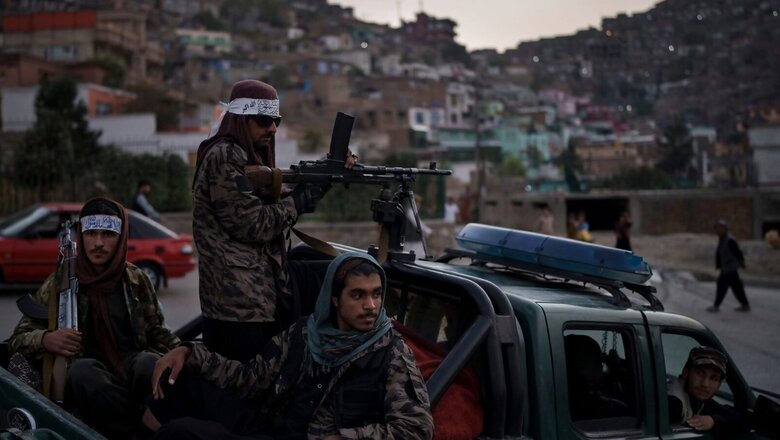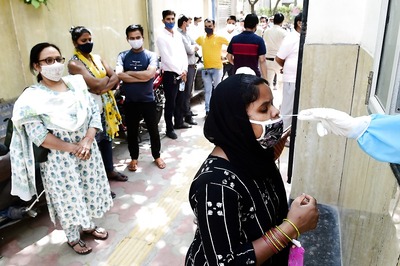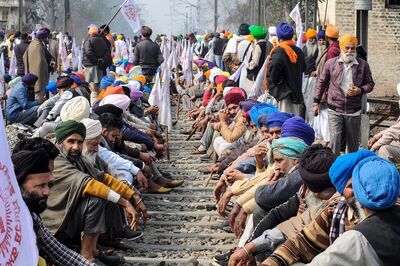
views
The Taliban, after taking over Afghanistan, announced a ‘caretaker government’ amid foreign pressure as the country faces a humanitarian crisis amid a governance collapse. On September 21, the Taliban government bolstered its economic team, naming a commerce minister and two deputies as the group tries to revive a financial system in shock from the abrupt end to billions of dollars in foreign aid.
Projecting an ‘inclusive’ and ‘moderate’ face, Taliban spokesperson Zabihullah Mujahid said the new Cabinet includes members of ethnic minorities such as Hazaras and Tajiks. However, according to reports, this is far from the reality.
These ethnic minority communities have not been granted prominent positions, and all inductions have been made with unknown faces, with the Haqqani and Baradar factions gaining the majority of authority, the Hindustan Times reports. The Islamist fundamentalists have not put a single woman in the Cabinet, as they had previously stated, but the Cabinet remains monopolistic even when it comes to ethnic minorities. Former Afghan presidents Hamid Karzai and Abdullah Abdullah have been granted no position in the new government.
Qalandar Ibad, Abdul Bari Omar, Mohammad Hassan Ghiasi, Haji Gul Mohammad, and Arsala Kharoti Lutfullah Khairkhwa are all members of the Haqqani Network. Qalandar Ibad is their new health minister, while the rest of the cabinet members are deputy ministers in other departments.
Mullah Mohammad Ibrahim, the new deputy minister of interior security, on the other hand, is a Pashtun from the Baradar faction. Mullah Abdul Qayyum Zakir, the deputy minister of defence, is likewise Pashtun and is known to be close to Mulla Yaqoob, the Taliban’s defence minister. Nazar Mohammad Muttamin, the acting president of Afghanistan’s National Olympic Committee, is a Pashtun from Kandahar and a member of the Baradar faction.
Mujeeb-ur-Rehman Omar, deputy minister of power and energy; Mohammad Faqir, acting director general of the Central Statistics Office; and Gul Zarin Kochi, second deputy minister of border affairs are all members of the Baradar faction.
Only one Hazara, three Tajiks, and one Uzbek are represented in the Cabinet’s 50-member composition. Tajiks such as Haji Ghulam Ghaus have been named as deputy ministers of disaster management and commerce, respectively, while Haji Nooruddin Azizi, a Panjshir Province resident, has been chosen as interim minister of trade. Another Tajik, Haji Mohammad Bashir, has been named as the deputy minister of business. The sole Uzbek in the new lineup is Haji Mohammad Azim Sultanzada.
The Taliban groups also include Najibullah, the director of atomic energy, Mawlawi Abdul Rahman Rashed, the minister of agriculture, Molavi Sad Razam, the deputy minister of agriculture, and Mawlawi Ataullah Omari, the deputy minister of agriculture.
CNN-News18 had earlier reported that there is a clear division between the Taliban and the Haqqani network, due to a political military divide created by Pakistan, top sources had said.
The Haqqanis, governed by ISI have managed to grab major roles for themselves in Afghanistan‘s new caretaker government. However, serious differences between the Taliban and Haqqanis still exist, also because of Hibatullah Akhundzada, who has not been seen recently and has ‘almost’ been replaced, the sources said.
When asked about reports that the current Afghan government was not inclusive enough, Taliban spokesperson Mohammad Suhail Shaheen had earlier told CNN-News18 in an exclusive interview that the government was a tentative one. “This is not our government in full, but a tentative government. There was urgency. The people needed essential services to be provided to them immediately. So, because of that, our leadership decided to appoint cabinet members of some of the more immediate Ministries. Still, there are some ministries, for which ministers will be appointed. That is for the future,” he had said.
Read all the Latest News , Breaking News and Ukraine-Russia War Live Updates here.




















Comments
0 comment